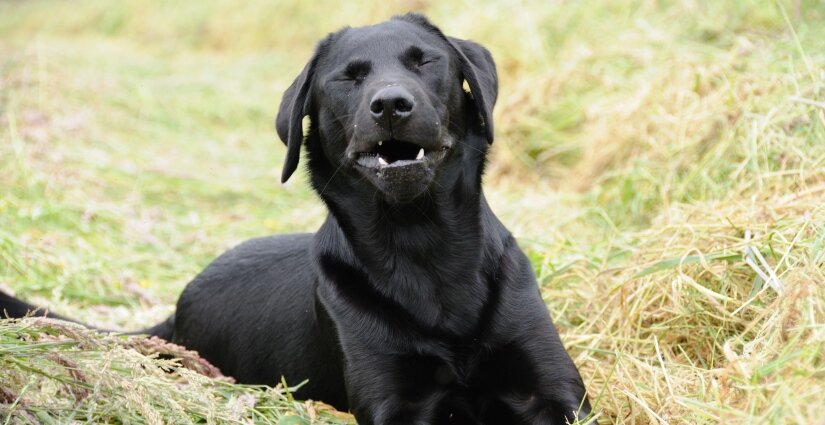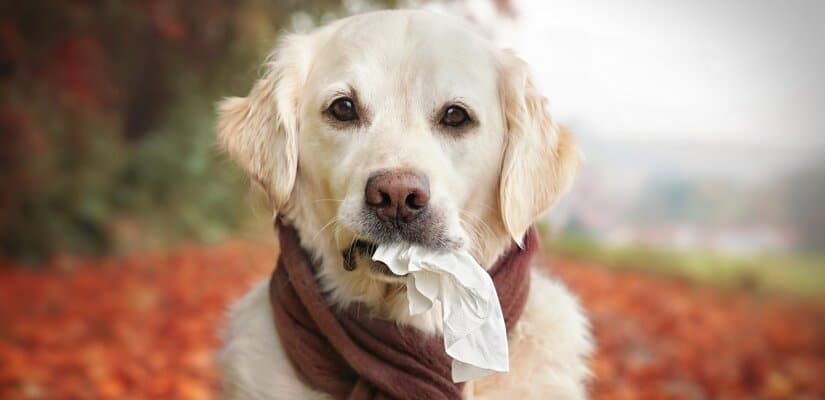If you hear your dog sneezing, you might not know the cause. It may be due to congestion from the flu or an allergic reaction! Like people, dogs sneeze too! It’s actually common, but if your dog sneezes a lot, you’ll need to examine common causes of allergies like home cleaning products, environmental and seasonal allergens, and health issues. If your dog is having a difficult time breathing in between sneezing episodes, and his tongue turns blue, you’ll need to visit your veterinarian right away.
The American Kennel Club (AKC) adds that “If your dog is frequently sneezing, experiencing nasal discharges, or appears to be in pain while sneezing, they need to be seen by a veterinary professional. Keep an eye out for any unusual behaviors paired with frequent sneezes, like bleeding or frequent pawing at their nose.”
The AKC explaining that something is obstructing the nasal passage that needs to be examined by a vet. Hunting dogs are at a higher risk for getting unusual items stuck up their snout since they’re always investigating the outdoors. It’s a good idea to check their snout daily in case leaves, twigs, or other outdoor fragments are stuck inside.”
Nasal Mites or Nasal Infection
They also explain that deep sneezing that comes from the chest may be a sign of a medical condition, as in the cold, and that in a small number of cases, deep sneezing may be due to nasal mites or nasal infections. All in all, it’s best to visit your veterinarian to rule out a health condition.
Dog Cold Symptoms
If you notice that your dog is sneezing, and you’re not sure as to whether he has allergies or a cold, here’s the take on symptoms of a dog cold:
- Coughing
- Sneezing
- Congestion
Keep in mind that kennel cough, bronchitis, dog flu, and the parainfluenza virus all have similar symptoms. As usual, watch out for the common cold symptoms like lack of appetite, lethargy, vomiting, diarrhea, and fever, and make sure that your furry best friend is current on all vaccines.
Kennel Cough or Cold

If you’re still confused, here’s what you need to know. Coughing can also be caused by a bacterial infection and does not only come from a viral infection.
Parasitic infections from heartworms and lung worms can also cause coughing. So can fungal infections and allergies, which will show up like cold-like symptoms. They can also lead to lung tissue damage and pneumonia in dogs.
Dog Flu
Symptoms occur one to five days after exposure, and often seem like “kennel cough.” It may continue for several weeks, and also transmitted to other dogs via droplets/aerosols that contain secretions after a cough, bark or sneeze. The symptoms for dog flu are the following:
- Sneezing
- High grade fever
- Nasal discharge
- Eye discharge
- Course coughing
- Dogs may also show signs of a secondary bacterial infection like pneumonia with an increased respiratory rate and effort
Dog Sneezing

A common cause of dog’s sneezing is allergies. Dogs are prone to allergies, just like people are. If you feel that your dog is suffering from allergies, you’ll need to find the cause. Your dog may also have itchy skin, a runny nose and eyes, and may be coughing and sneezing. As usual, it’s best to visit your veterinarian for a diagnosis and treatment.
Reverse Sneezing
If you hear your dog doing a reverse sneeze, he may be suffering from allergies. Sometimes these sneezes seem to be continuous. If you notice this, you should gently massage your dog’s throat and give him some fresh air.
With reverse sneezing your dog will stand will his head and neck up and withdrawn lips and forcefully inhale through their nostrils resulting with an unusual choking sound. When this happens you can briefly close the nostrils gently, and massage the dog’s throat. If your dog is reverse sneezing, you should still visit your vet to make sure that there are no other health conditions.
Honking Sneezing
If your dog seems to be making an unusual sound like a honk when he sneezes and has bluish gums and lethargy, then you should visit your emergency vet right away. This could be due to a collapsed trachea, which tends to affect smaller dog breeds. Here are some dog breeds that may be more sensitive to airborne allergies:
- Boston Terrier
- Boxer
- Dalmatian
- Chinese Shar-Pei
- Wirehaired Fox Terrier
- Labrador Retriever
- Scottish Terrier
- West Highland White Terrier
- Chesapeake Bay Retriever
- Lhasa Apso
- Shih Tzu
Continuous Sneezing
If your furry best friend doesn’t stop sneezing, then you should visit your vet in case it’s canine influenza. Sneezing is usually accompanied by a hacking cough, lethargy, runny nose and eyes, and may progress to pneumonia. You will need to visit your vet for treatment.
If you have the flu, you can also transmit it to your dog. “But most people don’t realize that humans can also pass diseases to animals, and this raises questions and concerns about mutations, new viral forms and evolving diseases that may potentially be zoonotic. And, of course, there is concern about the health of the animals,” Oregon State University and Iowa State University, via Science Daily.
Another study from Kansas State University explains that “The vast majority of these dogs have a mild form of the disease that lasts for about two to three weeks. They will get better with just supportive care,” via Science Daily.
“About 10 percent of these dogs can develop pneumonia, with the more severely affected dogs have generally been less than a year old or older than 7 years old.”
Dogs typically show signs of the disease two to four days after exposure. This incubation period between exposure and when symptoms develop is when dogs are the most contagious to other dogs. Dogs can shed the virus for up to seven to 10 days after exposure but continue to be contagious during this time. Because of this, infected dogs need to be quarantined from other dogs for about two weeks,” via Science Daily.
Therapeutic Treatment for Sneezing in Dogs
If your dog seems to be sneezing due to allergies, you can do the following:
- Remove the offending allergen
- Control and reduce the sneezing and the other allergy symptoms like itching with an allergy vaccine
- Reach out to your vet often, so that progress evaluations can take place and treatment plans updated to reduce excessive sneezing
Immune System & Allergies

Allergies are a reaction of the immune system caused by exposure to an allergen. Dogs are faced 24/7 with common household allergens ranging from insect toxins, pollens, molds, drugs, and even second-hand smoke.
Your dog may have a habit of sneezing if he’s a brachycephalic dog with a pushed-in nose; however, other health dangers can cause your dog to sneeze.
These are seven things that might be the cause of your dog’s continuous sneezing:
- Foreign bodies: Your dog sniffs everything in his environment. This means he could inhale foreign bodies like sticky foxtails, small bugs, and dirt that can get caught in his nasal passages. Take your dog to your local animal hospital if he paws at his nose or has a nosebleed, or has any visible lumps or bumps on his face or nose.
- Nasal Aspergillus infections: Your outdoor dog may develop a fungal infection from dust, grass, or hay that could lead to sneezing, swelling, and a bloody discharge from his nose. Dental infections can also cause sneezing due to nasal drainage.
- Nasal mites: Similar to ear mites, your dog can pick up parasites in his nose from dirt or infected dogs. Watch for nosebleeds and a discharge when your dog sneezes, and bring your dog to your veterinarian for a nasal swab to check for mites.
- Nasal tumors: Unfortunately, nasal tumors are common and could be caused by second-hand smoke. Whenever you observe your dog sneezing, you should ask your veterinarian for a diagnosis.
- Excitement: Your small dog may get very excited when he’s with people or other dogs. This excitement can result in sneezes that usually subside in a few minutes.
- Reverse sneeze: This type of sneeze is common in brachycephalic dogs like pugs and bulldogs. Your dog will inhale and exhale quickly; however, this behavior is usually not serious.
- Household and personal products: There are many perfumes, spray cleaners, detergents, and fabric softeners that may trigger your dog to sneeze. Cigarette and cigar smoke can irritate your dog’s nose and cause sneezing.
Now you have the seven causes for excessive dog sneezing so you can help keep your dog stay healthy. A dog uses his sense of smell to interpret his environment, which means he constantly sniffs the air, objects, and the ground. This means that you’ll need to keep his environment safe throughout his lifetime.
Indoor air pollution is common, and all dogs are susceptible to the health problems linked with indoor contaminants. By keeping your home well-ventilated and clean, you’ll be able to reduce indoor pollution to an acceptable level and help keep your dog allergy-free and hopefully sneeze-free!
